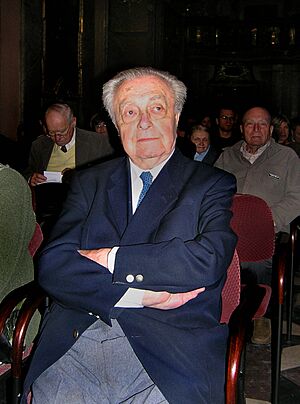Ilja Hurník facts for kids
Quick facts for kids
Ilja Hurník
|
|
|---|---|

Hurník in 2009
|
|
| Born | 25 November 1922 |
| Died | September 7, 2013 (aged 90) |
| Nationality | Czech |
| Occupation | Composer Essayist |
Ilja Hurník (born November 25, 1922 – died September 7, 2013) was a talented Czech composer and essayist. This means he wrote music and also wrote articles and stories.
Contents
About Ilja Hurník
Ilja Hurník was born in Poruba, which is now part of Ostrava in the Czech Republic. He loved music and went to study at the famous Prague Conservatory. After that, he continued his studies at the Prague Academy of Arts. There, he learned from a great teacher named Ilona Štěpánová-Kurzová.
Hurník wrote many different kinds of music. One of his pieces, called Sonata da camera, was written in 1952 for instruments like the flute, oboe, cello, and harpsichord. It was even recorded on a music label called Cedille Records.
Another interesting fact is that a CD released in 2008 featured two of his instrumental works. One was the colorful ballet music Ondráš, which he wrote in 1951. The other was his Four Seasons Chamber Suite from 1952. Both were performed by the famous Czech Philharmonic Orchestra.
Ilja Hurník came from a musical family! His son, Lukáš Hurník, is also a composer. He was also related to other musicians: he was the brother-in-law of Petr Eben and the uncle of Marek Eben. Ilja Hurník passed away in Prague on September 7, 2013, when he was 90 years old.
His Amazing Music
Ilja Hurník was a very busy composer and wrote music for many different types of performances and instruments.
Music for the Stage
He wrote several operas and ballets, which are like musical plays.
- Ballets: One of his well-known ballets was Ondráš, which was a Silesian folk ballad. He also created a funny ballet called Faux pas de quatre in 1978.
- Operas: He wrote comic operas, which are funny musical stories. One example is Dáma a lupiči (The Lady and the Robbers) from 1966. It was loosely based on a movie called The Ladykillers. He also wrote Rybáři v síti (Fishermen in Their Own Nets), another comic opera.
Music for Orchestras
Hurník composed many pieces for full orchestras and smaller groups of instruments.
- Suites and Serenades: He created a suite of dances from his Ondráš ballet for orchestra. He also wrote a beautiful Serenade for string orchestra in 1970.
- Symphonies: He composed a Symfonieta in 1996 and a Symphony in C in the year 2000.
Music for Solo Instruments and Small Groups
He wrote a lot of music for individual instruments and small groups of musicians, which is called chamber music.
- Concertos: He wrote concertos for instruments like the flute, oboe, and piano, where one instrument plays a solo part with an orchestra.
- Piano Music: Ilja Hurník wrote many pieces for the piano. Some of his earliest works were První melodie: Snadné přednesové skladbičky pro mládež (First Melodies: Easy Little Pieces for Young Students) from 1932, which were perfect for young piano players. He also wrote Nový clavecin (New Harpsichord) and Džezík (Jazz Piccolo), which were easy and fun pieces. He even wrote music for two or six hands playing on one piano!
- Chamber Pieces: He composed Čtvero ročních dob (The Four Seasons) for a group of wind instruments. He also wrote Vánočńí koledy (Christmas Carols) for violin and piano.
Music for Voices
Hurník also wrote music for singers, both solo voices and choirs.
- Songs: He composed song cycles like Květiny (Flowers) and Dívčí písně (Girl's Songs) for solo singers with piano. He even wrote Minutové písničky (Minute Songs), which were very short songs.
- Choral Works: He wrote many pieces for choirs. Noé (Noah) was an oratorio, which is a large musical work for voices and orchestra, based on a Biblical story. He also wrote Vánočńí Pastorela (Christmas Pastorella) for children's chorus, which is perfect for the holidays!
 | Tommie Smith |
 | Simone Manuel |
 | Shani Davis |
 | Simone Biles |
 | Alice Coachman |

